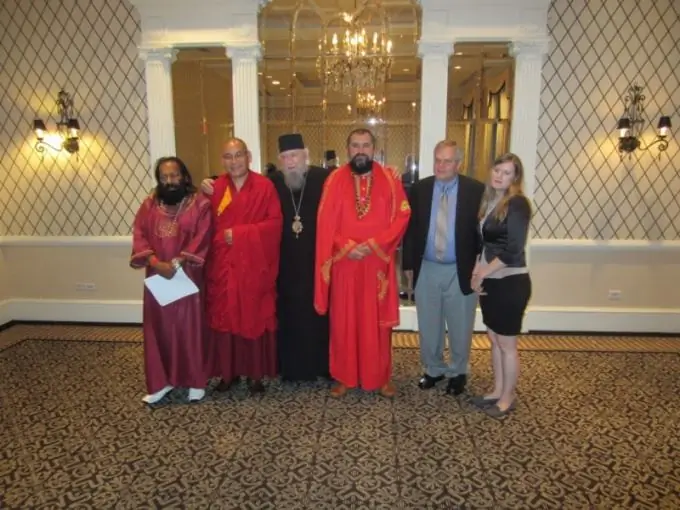- Author Antonio Harrison [email protected].
- Public 2023-12-16 07:44.
- Last modified 2025-01-22 21:44.
The relationship between science and religion is often presented as an irreconcilable opposition. Nevertheless, even a cursory glance at the history and modernity of science and religion allows us to conclude that such a view is very far from the truth.

Speaking about the struggle between science and religion, one usually recalls the scientists who suffered at the hands of the Inquisition or its Protestant counterpart, the Geneva Consistory.
Martyrs of Science
Scientists, traditionally considered martyrs of science, were also believers, only their ideas about God differed from those prevailing, and it was along this line that their conflict with the church took place. G. Bruno was condemned not for astronomical views (he cannot be called an astronomer at all), but for occultism. It was his occult ideas that compromised the theory of N. Copernicus in the eyes of the church, which subsequently caused the trial of G. Galileo. M. Servet was condemned not for the discovery of a small circle of blood circulation, but for the denial of the Trinity of God.
No one claims that the reprisal against people because of their religious beliefs is a blessing, but we can talk about an intra-religious conflict, and not about the confrontation between science and religion.
Science and religion in historical development
It is impossible to regard religion as the enemy of science, if only because in the Middle Ages, before the emergence of universities, the monasteries were the only focus of scientific knowledge, and in universities many professors were ordained. The clergy were the most educated class in medieval society.
The tradition of such an attitude to science was laid down by early Christian theologians. Clement of Alexandria, Origen, Gregory the Theologian, being versatile educated people, called upon to study the heritage of ancient pagan scientists, finding in it something useful for strengthening the Christian faith.
The interest of scholars in religion is observed in modern times. B. Pascal and N. Newton showed themselves not only in science, but also as religious thinkers. Among scientists there were and still are atheists, but in general, the ratio of the number of believers and atheists among scientists does not differ from the ratio among other people. The confrontation between science and religion can only be spoken about in the 19th century. with its strict materialism and partly by the 20th century, when in some states militant atheism was adopted by the authorities (USSR, Cambodia, Albania), and science was subject to the dominant ideology.
Relation of religion and science
To regard religion as the enemy of science is as absurd as to declare art as such: these are different ways of knowing the world. Of course, they do not exist in isolation, especially when both scientific and religious worldviews are inherent in an individual person. No contradiction arises in this case: nothing will cause such delight before the greatness of the Creator, as penetration into the secrets of His creation.
If, on the basis of faith, absurd ideas such as "scientific creationism" arise, then this does not come from faith as such, but from ignorance. Similar manifestations of deep ignorance are possible outside of religion - just remember the numerous "hereditary sorcerers", astrologers, psychics, "charging" water and other "specialists" of this kind, which are often believed by people who do not consider themselves to any religion.
The mutual influence of science and religion is also possible. For example, the Christian worldview opened the way for the development of scientific astronomy, overthrowing the ancient (pagan) concept of celestial bodies as animate, intelligent beings: ““Who says that the sky, the Sun, the Moon, the stars … - let it be anathema,”says the resolution of the Council of 543.
On the other hand, scientific knowledge opens up new horizons for believers. The development of science (in particular, the birth of the theory of evolution) forced the understanding of the Holy Scriptures to be raised to a new level, abandoning its literal interpretation.
It is more appropriate to consider science and religion not as enemies, but as allies. One cannot but agree with the great physicist M. Planck: “The never-ending struggle against skepticism and dogmatism, against unbelief and superstition is what religion and science are leading together. And the slogan in this struggle, indicating its direction, sounds at all times and forever: forward to God."






